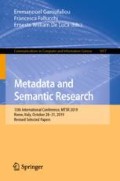Abstract
Competency Questions (CQs) assist in the development and maintenance of ontologies and similar knowledge organisation systems. The absence of tools to support the authoring of CQs has hampered their effective use. The few existing question templates have limited coverage of sentence constructions and are restricted to OWL. We aim to address this by proposing the CLaRO template-based CNL to author CQs. For its design, we exploited a new dataset of 234 CQs that had been processed automatically into 106 patterns, which we analysed and used to design a template-based CNL, with an additional CNL model and XML serialisation. The CNL was evaluated, showing coverage of about 90% with the 93 templates and their 41 variants. CLaRO has the potential to facilitate streamlining formalising ontology content requirements and, given that about one third of the CQs in the test sets turned out to be invalid questions, assist in writing good questions.
Access this chapter
Tax calculation will be finalised at checkout
Purchases are for personal use only
Notes
- 1.
- 2.
http://vicinity.iot.linkeddata.es/vicinity/; last accessed: 20 Dec. 2018.
- 3.
page 4 of http://studentnet.cs.manchester.ac.uk/pgt/2014/COMP60421/slides/Week2-CQ.pdf; last accessed: 9-1-2019.
References
Azzaoui, K., Jacoby, E., Senger, S., et al.: Scientific competency questions as the basis for semantically enriched open pharmacological space development. Drug Discov. Today 18(17), 843–852 (2013)
Bezerra, C., Freitas, F.: Verifying description logic ontologies based on competency questions and unit testing. In: ONTOBRAS, pp. 159–164 (2017)
Bezerra, C., Freitas, F., Santana, F.: Evaluating ontologies with competency questions. In: Proceedings of IEEE/WIC/ACM International Joint Conferences on Web Intelligence (WI) and Intelligent Agent Technologies (IAT) 2013, pp. 284–285. IEEE Computer Society, Washington, DC (2013)
Bezerra, C., Santana, F., Freitas, F.: CQChecker: a tool to check ontologies in OWL-DL using competency questions written in controlled natural language. Learn. Nonlinear Models 12(2), 4 (2014)
Dasiopoulou, S., Meditskos, G., Efstathiou, V.: Semantic knowledge structures and representation. Technical report. D5.1, FP7-288199 Dem@Care: Dementia Ambient Care: Multi-Sensing Monitoring for Intelligence Remote Management and Decision Support. http://www.demcare.eu/downloads/D5.1SemanticKnowledgeStructures_andRepresentation.pdf
Dennis, M., van Deemter, K., Dell’Aglio, D., Pan, J.Z.: Computing authoring tests from competency questions: experimental validation. In: d’Amato, C., et al. (eds.) ISWC 2017. LNCS, vol. 10587, pp. 243–259. Springer, Cham (2017). https://doi.org/10.1007/978-3-319-68288-4_15
Hallett, C., Power, R., Scott, D.: Composing questions through conceptual authoring. Comput. Linguist. 33(1), 105–133 (2007)
Hellmann, S., Lehmann, J., Auer, S., Brümmer, M.: Integrating NLP using linked data. In: Alani, H., et al. (eds.) ISWC 2013. LNCS, vol. 8219, pp. 98–113. Springer, Heidelberg (2013). https://doi.org/10.1007/978-3-642-41338-4_7
Keet, C.M.: Natural language template selection for temporal constraints. In: CREOL, JOWO 2017, vol. 2050, p. 12, Bolzano, Italy, 21–23 September 2017. CEUR-WS (2017)
Keet, C.M., Ławrynowicz, A.: Test-driven development of ontologies. In: Sack, H., Blomqvist, E., d’Aquin, M., Ghidini, C., Ponzetto, S.P., Lange, C. (eds.) ESWC 2016. LNCS, vol. 9678, pp. 642–657. Springer, Cham (2016). https://doi.org/10.1007/978-3-319-34129-3_39
Kuhn, T.: A survey and classification of controlled natural languages. Comput. Linguist. 40(1), 121–170 (2014)
Lyon, T.D., Saywitz, K.J., Kaplan, D.L., Dorado, J.S.: Reducing maltreated children’s reluctance to answer hypothetical oath-taking competency questions. Law Hum Behav. 25(1), 81–92 (2001)
Malheiros, Y., Freitas, F.: A method to develop description logic ontologies iteratively based on competency questions: an implementation. In: ONTOBRAS, pp. 142–153 (2013)
Malone, J., et al.: The software ontology (SWO): a resource for reproducibility in biomedical data analysis, curation and digital preservation. J. Biomed. Sem. 5(1), 25 (2014)
Moreira, J., Pires, L.F., van Sinderen, M., Daniele, L.: SAREF4health: IoT standard-based ontology-driven healthcare systems. In: Proceedings of FOIS 2018. FAIA, vol. 306, pp. 239–252. IOS Press (2018)
Mossakowski, T., Codescu, M., Neuhaus, F., Kutz, O.: The distributed ontology, modeling and specification language – DOL. In: Koslow, A., Buchsbaum, A. (eds.) The Road to Universal Logic. SUL, pp. 489–520. Birkhäuser, Cham (2015). https://doi.org/10.1007/978-3-319-15368-1_21
Ren, Y., Parvizi, A., Mellish, C., Pan, J.Z., van Deemter, K., Stevens, R.: Towards competency question-driven ontology authoring. In: Presutti, V., d’Amato, C., Gandon, F., d’Aquin, M., Staab, S., Tordai, A. (eds.) ESWC 2014. LNCS, vol. 8465, pp. 752–767. Springer, Cham (2014). https://doi.org/10.1007/978-3-319-07443-6_50
Safwat, H., Davis, B.: CNLs for the semantic web: a state of the art. Lang. Resour. Eval. 51(1), 191–220 (2017)
Salgueiro, A.M., Alves, C.B., Balsa, J.: Querying an ontology using natural language. In: Villavicencio, A., et al. (eds.) PROPOR 2018. LNCS (LNAI), vol. 11122, pp. 164–169. Springer, Cham (2018). https://doi.org/10.1007/978-3-319-99722-3_17
Suarez-Figueroa, M.C., de Cea, G.A., Buil, C., et al.: NeOn methodology for building contextualized ontology networks. NeOn Deliverable D5.4.1, NeOn Project (2008)
Thiéblin, E., Haemmerlé, O., Trojahn, C.: Complex matching based on competency questions for alignment: a first sketch. In: 13th International Workshop on Ontology Matching (OM 2018), pp. 66–70. CEUR-WS, Monterey (2018)
Uschold, M., Gruninger, M.: Ontologies: principles, methods and applications. Knowl. Eng. Rev. 11(2), 93–136 (1996)
Williams, P.: Resourcing for the future? Information technology provision and competency questions for school-based initial teacher education. J. Inf. Technol. Teach. Educ. 5(3), 271–282 (1996)
Wisniewski, D., Potoniec, J., Lawrynowicz, A., Keet, C.M.: Competency questions and SPARQL-OWL queries dataset and analysis. Technical report 1811.09529, November 2018. https://arxiv.org/abs/1811.09529
Zemmouchi-Ghomari, L., Ghomari, A.R.: Translating natural language competency questions into SPARQL queries: a case study. In: First International Conference on Building and Exploring Web Based Environments, pp. 81–86. IARIA (2013)
Author information
Authors and Affiliations
Corresponding author
Editor information
Editors and Affiliations
Rights and permissions
Copyright information
© 2019 Springer Nature Switzerland AG
About this paper
Cite this paper
Keet, C.M., Mahlaza, Z., Antia, MJ. (2019). CLaRO: A Controlled Language for Authoring Competency Questions. In: Garoufallou, E., Fallucchi, F., William De Luca, E. (eds) Metadata and Semantic Research. MTSR 2019. Communications in Computer and Information Science, vol 1057. Springer, Cham. https://doi.org/10.1007/978-3-030-36599-8_1
Download citation
DOI: https://doi.org/10.1007/978-3-030-36599-8_1
Published:
Publisher Name: Springer, Cham
Print ISBN: 978-3-030-36598-1
Online ISBN: 978-3-030-36599-8
eBook Packages: Computer ScienceComputer Science (R0)

